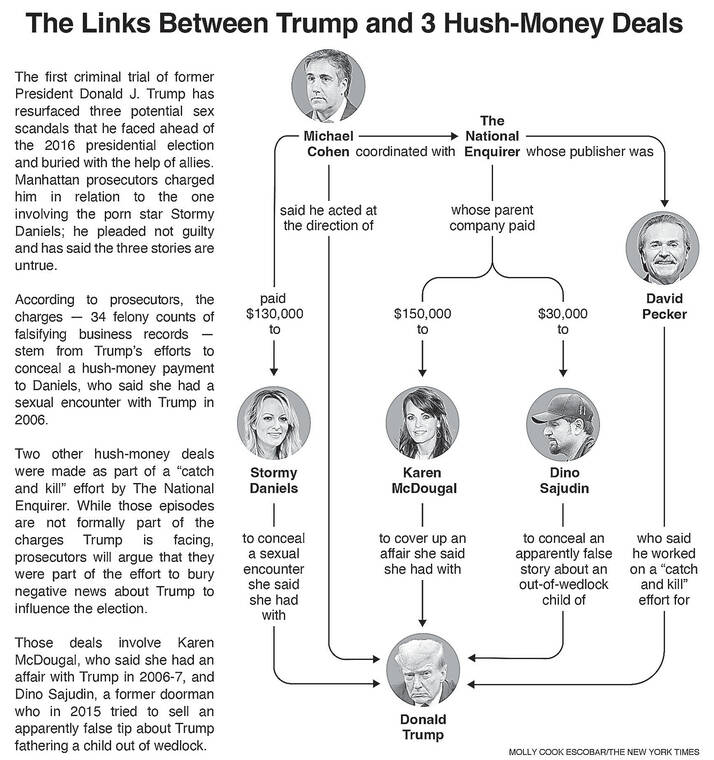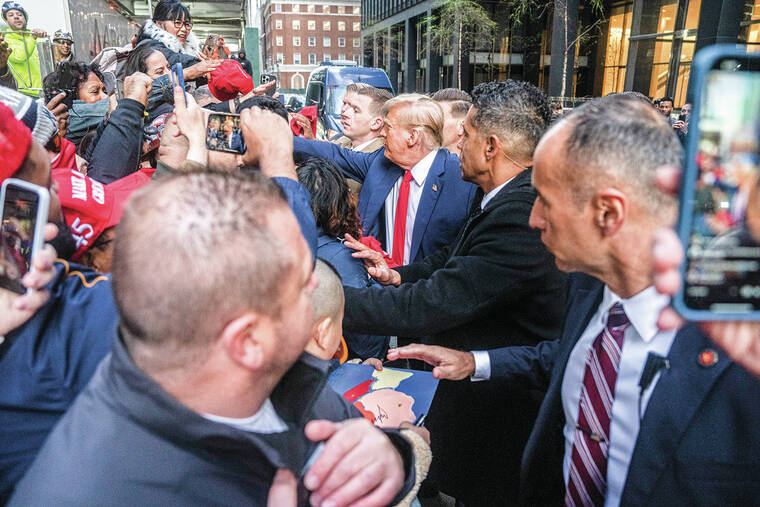Tabloid publisher describes deals to buy silence at Trump trial
NEW YORK — Days before Donald Trump became president in 2017, a cadre of advisers, officials and allies descended on his office at Trump Tower: a future secretary of state, his soon-to-be chief of staff, the FBI director — and the publisher of The National Enquirer.
The publisher, David Pecker, may have seemed out of place, but he had just performed an indispensable and confidential service to the Trump campaign: He had paid off a Playboy model, Karen McDougal, who had said she had an affair with Trump, and a doorman who had heard that Trump had fathered a child out of wedlock. The future president, triumphant, thanked Pecker for his service.
ADVERTISING
“He said, ‘I want to thank you for handling the McDougal situation,’ and then he also said, ‘I wanted to thank you for the doorman situation,’” Pecker testified at Trump’s criminal trial in Manhattan on Thursday, leaving it unclear if anyone else heard the exchange. “He said that the stories could be very embarrassing.”
Trump also asked after McDougal: “How’s our girl?” Pecker said he replied, “She’s cool. She’s very quiet. No issues.”
That remarkable scene — where Trump’s lofty new status as president-elect collided with his colorful New York habitat — was private until Thursday, when Pecker recounted it to jurors. He described in vivid detail how Trump depended on him to buy and bury damaging stories that could have derailed Trump’s campaign, the plot that prosecutors put at the center of the case.
Pecker’s testimony in the first criminal trial of an American president underscored how his support in 2016 is haunting Trump in 2024
Over nearly six hours of testimony Thursday, Pecker described how he had helped quash three scandalous stories about Trump, including by setting in motion a hush-money deal with a pornographic movie actor, Stormy Daniels. That payment is central to the prosecution’s case: Prosecutors have charged Trump with 34 felonies, accusing him of covering up the payoff to Daniels.
Pecker’s testimony, which kept many jurors rapt as Trump shifted and slumped in his chair, spoke to a central theme in the prosecution’s case. Pecker, prosecutors contend, joined a three-man conspiracy with Trump and Michael Cohen, the then-candidate’s personal lawyer. The men, they say, hatched a plot to hide damaging stories from the American people.
Pecker introduced the jury to a dark art in the world of supermarket tabloids, the practice known as “catch and kill” — buying the rights to a story with no intention of publishing it. The National Enquirer used the tactic to silence McDougal and the doorman with his account of an out-of-wedlock child, which turned out to be false.
He took jurors behind the scenes of the shady machinations, detailing how he had bought McDougal’s story for $150,000 and packaged the payment in a deal with other services that she would supposedly provide, including writing columns. Those services, he acknowledged, were camouflage for what he knew could have been an illegal donation to Trump’s campaign.
In a powerful moment for the prosecution, Pecker acknowledged a clear-cut motive for keeping the model’s story under wraps: protecting Trump’s chance of winning the White House.
“We didn’t want the story to embarrass Mr. Trump or embarrass or hurt the campaign,” Pecker testified.
He also acknowledged that it is unlawful for a corporation to spend money that way to influence the election, another pivotal moment in the early days of the trial.
(The Federal Election Commission later punished the Enquirer’s parent company with fines of $187,000; Trump’s campaign was not sanctioned.)
The Trump campaign was particularly concerned about Daniels’ story. Pecker explained to the jury that he had learned Daniels was looking to sell her story just as Trump’s campaign was reeling from the publication of an “Access Hollywood” recording, in which Trump boasted of grabbing women by their genitals.
That tape, he said, “was very embarrassing, very damaging to the campaign.”
Pecker then told Cohen, the fixer, of Daniels’ efforts to sell her story of having had sex with Trump. Cohen ultimately paid her off, to the tune of $130,000.
Pecker warned Cohen that if Daniels went public, Trump would be furious.
But Pecker had already shelled out the $150,000 to McDougal, and he balked at paying Daniels, leaving it to Cohen to strike the hush-money deal with her. “After paying out the doorman, after paying out Karen McDougal, we’re not paying out any more monies,” Pecker recalled telling Cohen.
The prosecutors, from the Manhattan district attorney’s office, accused Trump of falsifying business records when reimbursing Cohen for the $130,000 payment and charged the former president with 34 felonies — one for each check, ledger and invoice related to the repayment.
Trump denies that he and Daniels had sex and has said he did nothing wrong. If convicted, he could receive probation, or up to four years in prison.
After prosecutors finished with Pecker, Trump’s legal team got a crack at cross-examining him. Under questioning from one of Trump’s lawyers, Emil Bove, the tabloid publisher acknowledged that it was a standard practice for his publication to buy stories as leverage for access and interviews with celebrities. He also admitted giving Trump a heads-up about negative stories for years before he ran for president, helping the defense argue that his actions were unrelated to Trump’s status as a candidate.
Bove also briefly attempted to portray the 72-year-old Pecker as unreliable, pointing to small inconsistencies or omissions in his recounting of the events. But Pecker remained mostly composed and stuck to the testimony he gave prosecutors.
Under questioning from prosecutors, Pecker spent much of his time on the stand describing the deal with McDougal, whose lawyer brought the story to The National Enquirer, which then vetted the account.
McDougal, he said, was happy to stay quiet.
“She said she didn’t want to be the next Monica Lewinsky,” he explained.
Pecker alerted Cohen, who then pressed the tabloid to buy her story. When Pecker expressed concern about who would pay the $150,000 — noting that “this is a very, very large purchase” — Cohen reassured him. He said, “The boss will take care of it.”
And at one point, Trump and Pecker spoke directly about the deal, the former publisher testified. Trump, he said, called McDougal “a nice girl,” leading Pecker to believe that the candidate “knew who she was.”
Trump was reluctant to pay, and soon Cohen was waffling as well — instead, Cohen persuaded Pecker to have his company make the payment. He assured him that the boss would pay Pecker back.
Ultimately, when Cohen created a shell company to repay the tabloid, it was Pecker who got cold feet amid concerns about the legality of the arrangement.
“The deal is off,” Pecker said he told Cohen.
That was not the end of the saga. Just days before the election, The Wall Street Journal published a story revealing The National Enquirer’s deal with McDougal. This prompted an irate call to Pecker.
“Donald Trump was very upset,” Pecker said Thursday, describing how the candidate asked, “How could this happen? I thought you had this under control.” Trump, he said, blamed The National Enquirer for leaking the story. Then he hung up.
After Trump’s victory, Pecker encountered him at the Trump Tower meeting in January 2017 and then in July of that year at the White House.
“Mr. Trump asked me to join him in the walk from the Oval Office to the dining area,” Pecker recalled, and on the walk, Trump posed a question: “How is Karen doing?”
Pecker replied: “She’s doing well. She’s quiet. Everything’s going good.”



